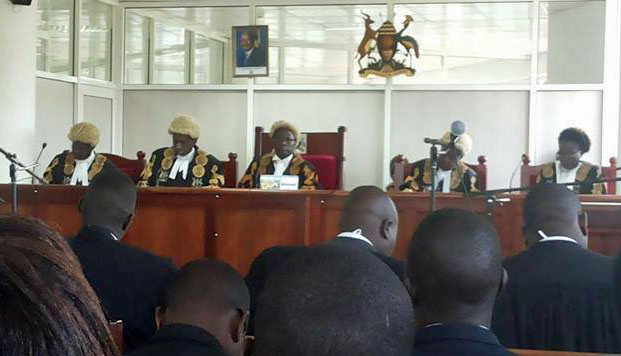
Kampala, Uganda | THE INDEPENDENT | The constitutional court has quashed Rule 8(2) and 3 of the Judicature Small Claims Procedure Rules of 2011, which bars advocates from small claims proceedings.
A panel of five Constitutional court Judges led by Justice Fredrick Egonda Ntende has unanimously ruled that the provisions barring advocates from small claims proceedings contravene the right to a fair hearing and legal representation.
The other judges are Elizabeth Musoke, Cheborion Barishaki, Muzamiru Mutangula Kibeedi and Irene Mulyagonja.
The judgement stems from an application filed by Israel Ssejemba against the Attorney General in 2014.
The Constitutional Court panel led by Justice Fredrick Egonda Ntende has unanimously ruled that the provision under the Judicature Small Claims Procedure Regulations of 2011 barring an advocate during the proceedings contravenes with the Constitutional right to fair hearing which also includes the right to legal representation.
According to the court records, on October 16th, 2014, Ssejemba received summons from Makindye’s Chief Magistrates Court ordering him to pay Male Kawuma Shillings 9.5 million.
As a result, Ssejemba contacted his lawyers of Ekirapa and Company Advocates to represent him. However, the lawyers informed him that they could only advise him how to proceed on the matter since Rule 8(2) and 3 of the Judicature Small Claims Procedure Rules of 2011 bars them from appearing in small claims matters, cases whose subject value doesn’t exceed Shillings 10 million.
Rule 8(2) and 3 of the Judicature Small Claims Procedure Rules of 2011 provides that “A party to an action shall appear in person before the court and shall not be represented by an Advocate during the proceedings.”
Ssejemba explains upon further reading of the Small Claims Procedure Rules and Guidelines, he also discovered that the rules don’t provide for the cross-examination of witnesses and that magistrate’s decision is final and cannot be appealed.
Only the same magistrate can review the decision, which Ssejemba said was illegal.
As a such, Ssejemba decided to challenge the provisions through his lawyers led by Obiro Ekirapa on grounds that they were unconstitutional.
However, State Attorney, Claire Kukunda who represented the Attorney General opposed the application, saying that the Rules Committee chaired by the Chief Justice was aware of the principle of fair hearing when it designed the Small Claims Procedure.
Kukunda noted that the principle of fair hearing is not premised on legal representation but rather on partiality and fairness of the court permitting the parties before it to adduce evidence unhindered by technicalities.
In their ruling, the judges noted that although the right to appeal is not stated in the Small Claims Procedure Rules, it can be exercised by relying on provisions in the Constitution and the Magistrates Act, which provide for the right of appeal against all decisions made by Magistrates.
In their judgment written by Cheborion Barishaki, the justices agreed that the silence on the right to appeal doesn’t mean that the rules are unconstitutional. They, however, ruled that it is unconstitutional to bar cross-examination of witnesses in small claims, saying it is important in revealing the truth.
“Rule 24 provided no justification for the bar on cross-examination of parties and witnesses. In a trial without cross-examination, the guilt or innocence and the rights of a party might be decided on a perjured, biased or erroneous testimony. Cross-examination helps to bring these ills to light”, held the Judges.
The justices also found the provision barring advocates from appearing in small claims procedures unconstitutional.
“Therefore, the right to legal representation and cross-examination are at the core of the right to a fair trial or hearing under article 28 of the Constitution which is a non-derogable right under Article 44 of the Constitution and the Judicature Small Claims Procedure Rules cannot diminish or extinguish it”, reads the judgment.
Since the matters touch on public interest, the Judges have ordered each party to bear its own costs.
****
URN
 The Independent Uganda: You get the Truth we Pay the Price
The Independent Uganda: You get the Truth we Pay the Price


